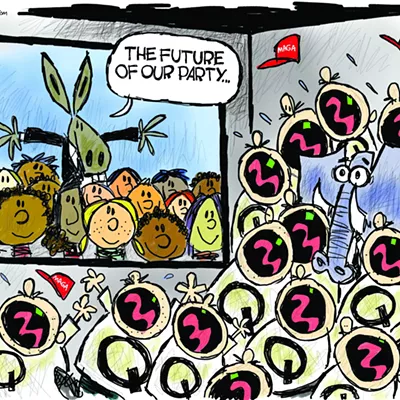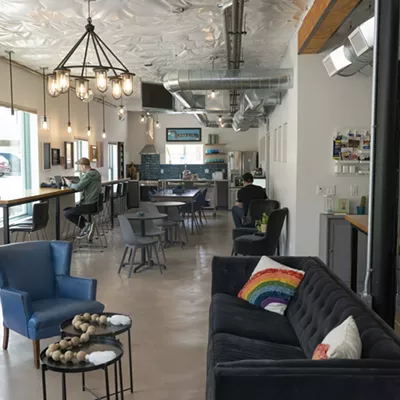"I'm really excited about the possibilities," says Kathy Prather, administrator for career and technical education with the Tucson Unified School District. "It will provide funding to build a workforce for Southern Arizona that is heavily tied to academics, and that's what local industries are looking for."
Former Amphitheater Unified School District board member Mary Schuh doesn't agree.
"I hear, 'It's for the kids,'" says the taxpayer watchdog, "but all I can see is the employment of adults, lots of them."
Proposition 400 is on the ballot in 11 school districts throughout Pima County, proposing the establishment of a joint technological education district (JTED). Currently, 70 Arizona school districts are involved with 10 JTEDs across the state.
To fund the new overlay school district, property taxes would increase by about $5 for every $100,000 in assessed valuation, in those Pima County districts where Proposition 400 is adopted. If all the school districts approve 400, the higher taxes are estimated to bring in $2.9 million yearly, which would be supplemented by approximately $3.4 million from the state of Arizona.
Controlling this money and governing the district will be a new school board composed of one member representing each district whose voters approve the proposition. The membership of this board will at first be appointed, but will be subject to election beginning in 2008.
This new board would hire a superintendent and other staff members, secure office space and be responsible for providing vocational and technical training to any public, private, charter or home-schooled high school student who wishes to enroll. This goal would be achieved either though intergovernmental agreements with participating school districts or by developing a new, centralized JTED campus.
"The type of education we're looking at," says Prather, "includes the trades, but expands into high-tech areas such as pre-engineering and nursing. ... This really is a major issue for economic development and could transform our secondary education."
Schuh has several objections to the proposal. She doesn't like the fact that participating school districts will have to pay for the idea themselves during its first year, since the property tax hike won't be imposed until later. She also emphasizes there are numerous job-training programs already available in Tucson; she calls the proposed JTED board "a faceless group of people in charge of a great deal of money."
Prather argues Pima County taxpayers "will be putting up a little amount (of money) to receive a much greater amount of state funds." She also points out that because of a focus on the AIMS test and other priorities, TUSD funding for its existing 22 career-training programs has been stagnant for many years, while expenses have shot up due to pricey technology.
Schuh responds: "If additional funding for vocational education is so important, why didn't (Tucson leaders) lobby the state Legislature to allow the school districts to use the money (directly)? Why have a whole new layer of government?"
Prather points to projections showing that a large percentage of the skilled workforce will be lost due to the retirement of baby boomers during the next decade. "We have shortages in the local workforce, at Raytheon, in health care and in construction," she says.
Schuh says she's calculated that Tucson and Amphitheater school district taxpayers will provide almost two-thirds of the property-tax revenue, yet only have two votes on the new board. "This is being pushed by people who say, 'You need to pay my (job-training) bills.'
"It's not my desire to be taxed to help fund the Catalina Foothills School District," Schuh adds. "There are just too many unknowns, both fiscally and philosophically."
Meanwhile, two tax-related propositions near the top of the ballot apparently won't have much of an impact in Tucson.
Proposition 101 proposes to update an annual 2 percent cap placed on property-tax increases back in 1980. Since some governmental entities haven't utilized the full 2 percent each year, they could potentially raise their rates by more than that amount. To prevent that from happening, Proposition 101 would change the base year to 2005.
While pointing out taxing authorities would be penalized by the proposition for being fiscally prudent, Pima County officials indicate the passage of 101 wouldn't present any problems for them. At Pima Community College, they've come to the same conclusion, with a spokesman stating the proposition apparently won't have any impact.
While 101 seeks to limit property taxes, Proposition 104 could increase them, because it would allow governments to sell more bonds, which are often repaid through property taxes.
Presently, Arizona governments are limited in their maximum bonding capacity to 20 percent of their total assessed valuation for utility and park purposes, and 6 percent for all other projects. Passage of Proposition 104 would shift transportation and public-safety improvements from the 6 percent category to the 20 percent category.
That change, however, won't affect taxpayers living inside the Tucson city limits. That's because a local charter provision places a more severe cap on total Tucson indebtedness than state law does. Thus, even if Proposition 104 passes, the city's current debt availability of about $200 million in new general-obligation bond capacity shouldn't be impacted one way or another.









